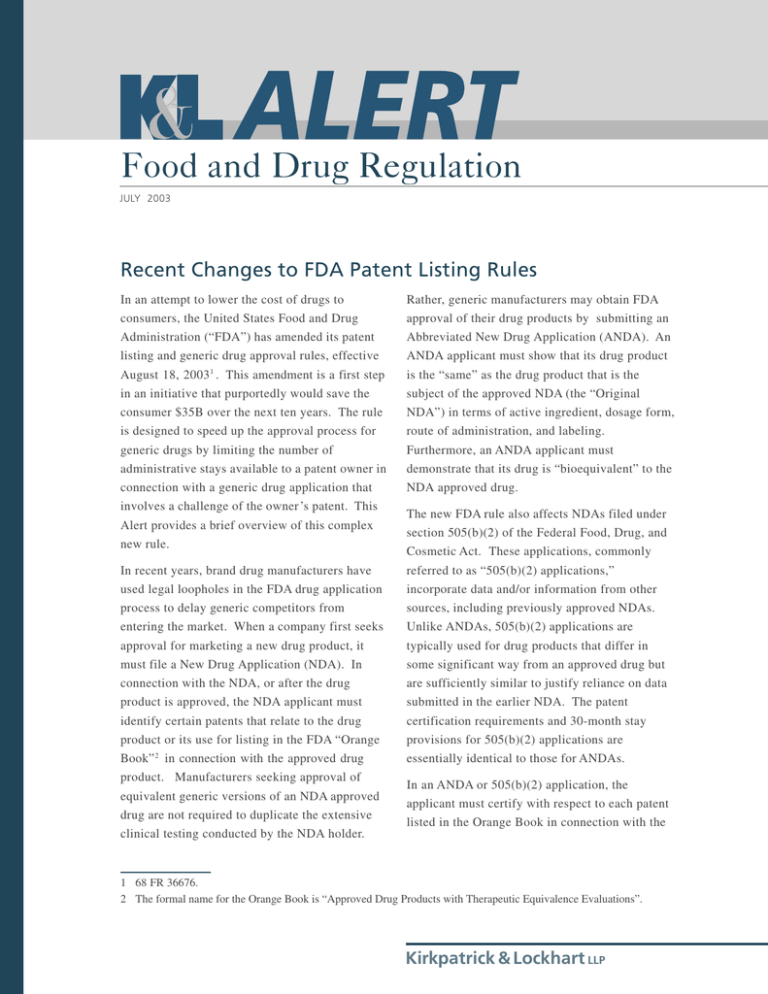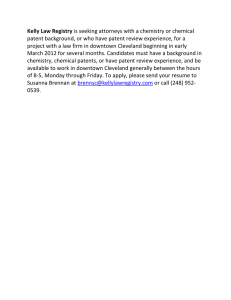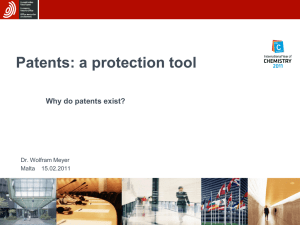
Food and Drug Regulation
JULY 2003
Recent Changes to FDA Patent Listing Rules
In an attempt to lower the cost of drugs to
consumers, the United States Food and Drug
Administration (“FDA”) has amended its patent
listing and generic drug approval rules, effective
August 18, 2003 1 . This amendment is a first step
in an initiative that purportedly would save the
consumer $35B over the next ten years. The rule
is designed to speed up the approval process for
generic drugs by limiting the number of
administrative stays available to a patent owner in
connection with a generic drug application that
involves a challenge of the owner’s patent. This
Alert provides a brief overview of this complex
new rule.
In recent years, brand drug manufacturers have
used legal loopholes in the FDA drug application
process to delay generic competitors from
entering the market. When a company first seeks
approval for marketing a new drug product, it
must file a New Drug Application (NDA). In
connection with the NDA, or after the drug
product is approved, the NDA applicant must
identify certain patents that relate to the drug
product or its use for listing in the FDA “Orange
Book” 2 in connection with the approved drug
product. Manufacturers seeking approval of
equivalent generic versions of an NDA approved
drug are not required to duplicate the extensive
clinical testing conducted by the NDA holder.
Rather, generic manufacturers may obtain FDA
approval of their drug products by submitting an
Abbreviated New Drug Application (ANDA). An
ANDA applicant must show that its drug product
is the “same” as the drug product that is the
subject of the approved NDA (the “Original
NDA”) in terms of active ingredient, dosage form,
route of administration, and labeling.
Furthermore, an ANDA applicant must
demonstrate that its drug is “bioequivalent” to the
NDA approved drug.
The new FDA rule also affects NDAs filed under
section 505(b)(2) of the Federal Food, Drug, and
Cosmetic Act. These applications, commonly
referred to as “505(b)(2) applications,”
incorporate data and/or information from other
sources, including previously approved NDAs.
Unlike ANDAs, 505(b)(2) applications are
typically used for drug products that differ in
some significant way from an approved drug but
are sufficiently similar to justify reliance on data
submitted in the earlier NDA. The patent
certification requirements and 30-month stay
provisions for 505(b)(2) applications are
essentially identical to those for ANDAs.
In an ANDA or 505(b)(2) application, the
applicant must certify with respect to each patent
listed in the Orange Book in connection with the
1 68 FR 36676.
2 The formal name for the Orange Book is “Approved Drug Products with Therapeutic Equivalence Evaluations”.
Kirkpatrick & Lockhart LLP
Original NDA upon which the application relies,
that, to their knowledge: I) no relevant patent has
been filed; II) such patent is expired; III) such
patent will expire on a certain date; or IV) such
patent either is invalid or will not be infringed by
the proposed drug product (commonly referred to
as Paragraph I, II, III and IV Certifications,
respectively). If an ANDA or 505(b)(2) applicant
submits a Paragraph IV Certification, it must send
notice to the patent owner and to the Original
NDA holder that provides a sufficiently detailed
analysis of the legal basis for the certification of
non-infringement and/or invalidity. The patent
owner then has 45 days in which to initiate a
patent infringement suit in response to the
submission of the ANDA or 505(b)(2)
application 3 . If an infringement suit is filed, the
FDA is barred from approving the generic
application for 30 months, or until the ANDA or
505(b)(2) applicant wins the patent litigation,
whichever occurs first. 4
Importantly, there previously was no limit to the
number of 30-month stays that could block
approval of generic applications. Likewise, while
there was a statutory limitation on the types of
patents that were eligible for listing in the Orange
Book, there was no real enforcement of the
limitation by the FDA. For that reason, Original
NDA holders often would file a series of
questionable improvement patent applications that
relate not to the actual drug or its approved use,
but, for example, to: processes for making the
drug; unapproved methods of using the drug; drug
metabolites and intermediates; and drug
packaging. Original NDA holders often would list
the patent in the Orange Book during the
pendency of a 30-month stay, and seek an
additional 30-month stay when the ANDA or
505(b)(2) applicant amends its Paragraph IV
Certification to include the new patent. Years
could pass before an application would be
approved by the FDA for a generic drug product,
despite the fact that the original patent on the drug
substance/product has expired.
By amending Rules 21 C.F.R. §§ 314.52, 314.53
and 314.95, the FDA has attempted to address this
legal loophole by defining the types of patents that
should and should not be listed in the Orange
Book in connection with a particular approved
drug product. Specifically, amended Rule
314.53(b)(1) states that the NDA applicant and
those with an approved NDA “shall” submit
information on the following types of patents:
1. drug substance (active ingredient and
polymorph5 ) patents, though in the case of
polymorphs, the applicant must certify that it
has test data demonstrating that a drug product
containing the polymorph will perform the
same as the drug product described in the
NDA6 ;
2. drug product (formulation and composition)
patents; and
3. method-of-use patents claiming indications or
other conditions of use that are the subject of a
pending or approved application.
3 The submission of an ANDA or 505(b)(2) application is considered an act of patent infringement under 35
U.S.C. § 271(e)(2).
4 See, generally, 21 U.S.C. § 355. The court hearing the patent case retains the authority (as with any patent
case) to issue a preliminary injunction to bar approval of the ANDA or 505(b)(2) application beyond the 30month period. Additionally, the court has specific statutory authority to shorten or lengthen the 30-month
period if either party to the action fails to reasonably cooperate in expediting the action.
5 A drug substance that is the same active ingredient but in a different physical form; namely, chemicals with
different crystalline forms, different waters of hydration, solvates and amorphous forms.
6 Although the regulation becomes effective on August 18, 2003, the compliance date for submission of
information on polymorph patents is December 18, 2003.
2
KIRKPATRICK & LOCKHART LLP FOOD AND DRUG REGULATION ALERT
Information on the following types of patents
“must” not be submitted in connection with a
NDA according to Rule 314.53(b)(1):
1. process patents that claim methods of making
the drug substance or drug product;
2. patents claiming metabolites of the drug
substance;
3. patents claiming intermediates of the drug
substance; and
4. patents claiming packaging.
Of note, the amended rules require patent
information to be provided on specific declaration
forms, FDA Forms 3542 or 3542a, that require the
NDA applicant to describe in some detail exactly
how the patent relates to the subject drug product.
The amendments to Rules 314.52 7 and 314.958
limit to one the number of 30-month stays
available under 21 U.S.C. § 355 in connection
with each 505(b)(2) application or ANDA. This
limitation applies even though it may be necessary
for the 505(b)(2) application or ANDA applicant
to file additional Paragraph IV Certifications to
account for the listing of additional patents in the
Orange Book by the Original NDA holder.
patent owner to sue a third party for patent
infringement. Irrespective of the speed at which
the FDA can approve a 505(b)(2) application or an
ANDA, a generic manufacturer is not released
from the requirements of the U.S. Patent Laws and
can be sued for making, using, selling, offering
for sale or importing any patented invention or
importing a product of a patented process 9 . An
accused infringer can be enjoined from infringing
activities and can be required to pay damages,
provisional damages, costs and fees, as are
appropriate. It should be noted that pending
Federal legislation could affect this result.
Unfortunately, the limited nature of this Alert does
not permit us to fully address all of the intricacies
of the final rule and its likely impact on both the
branded and generic pharmaceutical industries.
Please feel free to contact us if you would like to
discuss how these new rules, as well as the
pending legislation, may affect your particular
business.
JESSE A HIRSHMAN
jhirshman@kl.com
412.355.8966
By limiting the number of stays available in
connection with any given 505(b)(2) application
or ANDA and limiting the types of patents that
can be listed in connection with a drug product,
these amended Rules should substantially reduce
the approval times for many 505(b)(2)
applications and ANDAs. Nevertheless, one
important caveat to all of the above is that FDA
administrative rules, such as the amendments
described above, do not affect the ability of a
GARY L YINGLING
gyingling@kl.com
202.778.9124
MICHAEL H HINCKLE
mhinckle@kl.com
202.778.9296
MARK R LESLIE
mleslie@kl.com
412.355.6271
7 21 C.F.R. 314.52(a)(3) (pertaining to 505(b)(2) applications).
8 21 C.F.R. 314.95(a)(3) (pertaining to ANDAs).
9 35 U.S.C. §§ 271(a) and (g).
JULY 2003
Kirkpatrick & Lockhart LLP
Kirkpatrick & Lockhart’s Food & Drug Practice offers comprehensive legal and regulatory
counseling to companies and other organizations regulated by the FDA under the Federal Food,
Drug, and Cosmetic Act. The Food & Drug Practice represents manufacturers and distributors
of food, dietary supplement, pharmaceutical, medical device, personal care and cosmetic
products, and products of biotechnology, as well as trade associations, individuals and
institutions involved in clinical research of FDA-regulated products.
PARTNERS
Suzan Onel
Gary L. Yingling
202.778.9134
202.778.9124
sonel@kl.com
gyingling@kl.com
OF COUNSEL
Emalee G. Murphy
Donald R. Stone
202.778.9428
202.778.9067
emalee.murphy@kl.com
dstone@kl.com
ASSOCIATES
Ann M. Begley
Rebecca L. Dandeker
Jodi Finder
Michael H. Hinckle
202.778.9365
202.778.9409
202.778.9044
202.778.9296
abegley@kl.com
rdandeker@kl.com
jfinder@kl.com
mhinckle@kl.com
®
Kirkpatrick & Lockhart LLP
Challenge us. ®
www.kl.com
BOSTON
n
DALLAS
n
HARRISBURG
n
LOS ANGELES
n
MIAMI
n
NEWARK
n
NEW YORK
n
PITTSBURGH
n
SAN FRANCISCO
n
WASHINGTON
.........................................................................................................................................................
This bulletin is for informational purposes and does not contain or convey legal advice. The information herein
should not be used or relied upon in regard to any particular facts or circumstances without first consulting a lawyer.
© 2003 KIRKPATRICK & LOCKHART LLP.
ALL RIGHTS RESERVED.



